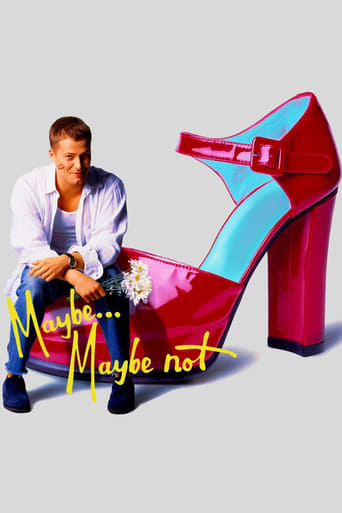kicuneoreg
Exceptionally well made movie adaptation based on Ralph König's books "Der Bewegte Mann" and "Pretty Baby". It is true as some have pointed out that this movie is rather hostile towards women and shows gay men as garish caricatures but that is exactly the point, that has always been König's style and any sort of tuning down or added political corectness would have pretty much destroyed the entire idea.
Constant fireworks of witticisms definitely suffers when or if the movie is subtitled but that is unfortunately the case with many films, not just this one and I doubt there is much to do about it unless you're willing to learn German and even then the basics you learn in school might not be enough. Reading the aforementioned comics might help though as this adaptation is very loyal to the original text.
Marie Hunter (RieRieZILLA)
`Maybe, Maybe Not' is one of the most odd movies I've ever seen. I liked it. I think I liked it because it is so completely different than all the American movies I'm used to seeing. In the beginning, the main character, Axel, decides to randomly have sex with some girl in the bathroom of his workplace. A woman in the next stall recognizes the key chain that dropped from one of the fornicating couple's clothes. She peeks over the stall to find her boyfriend of three years mindlessly humping another woman. She kicks him out of their apartment and throughout the rest of the movie he struggles with where to live. Initially he calls old girlfriends who all readily turn him away. Then he ends up at a `men's group' with a lot of gay guys. After that, he gets drunk at a party and goes home to sleep at one of their houses. This is when the gender preference battle begins. A lot of stereotypes were defied in this movie and I found that extremely refreshing. For example, it is commonly thought in American society that gay men are promiscuous, however in this movie, no homosexual sex is shown. There is one man-to-man kiss in the club and in another scene homosexual activity is inferred while watching slides but not directly shown on the screen. There are, however, two comparatively graphic heterosexual scenes. Another stereotype defied was the `effeminate gay men' stereotype. The main gay character, Norbert, didn't act effeminate at all, not even in drag. My favorite part of the movie however perpetuated and made fun of an existing stereotype - the stupid Stallone-loving straight guy. The guys in the movie theater were very intriguing. I thought they added welcome comic relief to an otherwise tense and dark movie.
Shayne013a
This is gem of a movie which does not lose any of its wit and charm with the passage of time. The fast pace and irreverence to social institutions kept us howling until our sides ached. Don't misunderstand me, however; the plot of one mans journey to his sexuality is pursued with fever right up to its hilarious climax! I would say that anyone of any sexual orientation with a sense of humor should watch this one with a friend or lover or both!
Stefan Kahrs
This is yet another of those cases where Anglosaxon audiences might be tempted to think that it reenforces their prejudice that German humour is a no-show.The problem can be described in one word: subtitles. I (a native German speaker) watched the UK release which is the original German version with English subtitles. The dialogue of this film is very funny and sharp; it is quite different from contemporary funny English dialogue which usually goes for funny one-liners, it has more in common with the humour you find in Oscar Wilde, for example in The Importance of Being Earnest. In other words, the characters are constantly trying to (literally) outwit each other whilst keeping the conversation afloat. This kind of dialogue is quite fashionable in certain parts of German culture, but at least in Britain it has become fairly rare. Consequently, the translators had a difficult job on their hands.Occasionally my eyes wandered towards the subtitles to see what the translators did with the latest banter - and I was appalled with what I found. Yes, the translation was factually accurate, i.e. the content of what was said was accurately translated, but all the wit, the sharpness, the humour had gone. As already mentioned, this was a difficult translation job, but the translators did not try hard enough.



